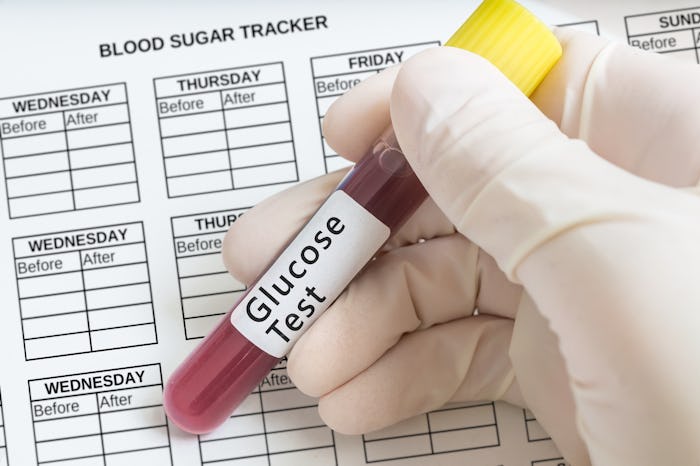Life

Everything You Need To Know About The Glucose Test
As your third trimester nears, you can almost see the finish line of your pregnancy. You might start thinking about everything you need to tackle before the baby arrives, from painting the nursery to planning your maternity leave. But don't forget to schedule your glucose test, too. If this is your first pregnancy, you may not have heard about this before — so what is the glucose test exactly and what does it test for? While a glucose test might sound a little scary at first, it's a simple screening that will make sure that your pregnancy is healthy.
All expectant moms are at risk of developing gestational diabetes, which is a temporary form of diabetes where the pregnant body can't produce enough insulin to regulate sugar levels. The American Pregnancy Association noted that 2 to 5 percent of pregnant women will develop gestational diabetes — Parents magazine, however, put the number closer to 18 percent — and your risk will go up if you have certain health issues, such as high blood pressure. Because gestational diabetes can cause birth complications, it's important for pregnant women to take a glucose test because it checks for gestational diabetes.
Usually, your OB-GYN or midwife will ask you to take a glucose test between the 24th and 28th weeks of your pregnancy. You may need to be screened sooner though if you have risk factors like a family history of diabetes, according to the Mayo Clinic. The test itself is very straightforward and not scary at all — I know this because I've taken it twice and I'm kind of a wimp.
When you arrive for the test, you'll be given a syrupy glucose solution to drink (think Kool-Aid with extra sugar). Most women won't experience any side effects, but the U.S. National Library of Medicine reported that some women might feel sweaty or lightheaded. An hour after you've finished the drink, the medical staff will take a blood sample from your arm to test for gestational diabetes. That's it.
Once your results come in, your health provider will let you know if your blood sample fell within normal levels or if you should come in for another test. If you are asked to come in again, try not to worry. This doesn't mean that you have gestational diabetes — it only means that your doctor wants to do another screening. Even if you are diagnosed with gestational diabetes down the road, your OB-GYN will help you manage and monitor your glucose levels until your delivery.
After you get pregnant, you'll start spending a lot of time in medical offices, from regular check-ups to ultrasound visits to trips to the lab to get a glucose test. While keeping up with all of these appointments can get a little annoying, you're making sure that you and your baby are as healthy as possible. Chances are that you won't have gestational diabetes, but if you do develop it, try to remember that many women have been in your shoes and that you are definitely not alone.